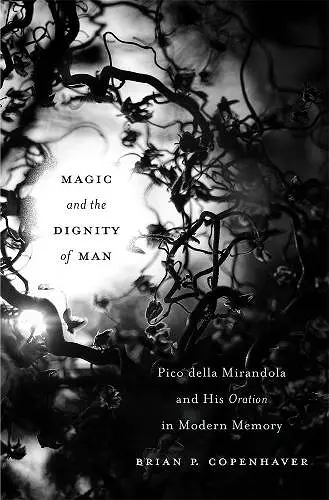Magic and the Dignity of Man
Pico della Mirandola and His Oration in Modern Memory
Format:Hardback
Publisher:Harvard University Press
Published:29th Nov '19
Currently unavailable, and unfortunately no date known when it will be back

“This book is nothing less than the definitive study of a text long considered central to understanding the Renaissance and its place in Western culture.”
—James Hankins, Harvard University
Pico della Mirandola died in 1494 at the age of thirty-one. During his brief and extraordinary life, he invented Christian Kabbalah in a book that was banned by the Catholic Church after he offered to debate his ideas on religion and philosophy with anyone who challenged him. Today he is best known for a short speech, the Oration on the Dignity of Man, written in 1486 but never delivered. Sometimes called a “Manifesto of the Renaissance,” this text has been regarded as the foundation of humanism and a triumph of secular rationality over medieval mysticism.
Brian Copenhaver upends our understanding of Pico’s masterwork by re-examining this key document of modernity. An eminent historian of philosophy, Copenhaver shows that the Oration is not about human dignity. In fact, Pico never wrote an Oration on the Dignity of Man and never heard of that title. Instead he promoted ascetic mysticism, insisting that Christians need help from Jews to find the path to heaven—a journey whose final stages are magic and Kabbalah. Through a rigorous philological reading of this much-studied text, Copenhaver transforms the history of the idea of dignity and reveals how Pico came to be misunderstood over the course of five centuries. Magic and the Dignity of Man is a seismic shift in the study of one of the most remarkable thinkers of the Renaissance.
Massive, lively, and learned…He explains how and why historians decided to put this Renaissance philosopher and his ideas not only in a box, but in the wrong one…Copenhaver analyzes the arguments of Pico’s critics with precision and panache…[He] has cut through generations of misguided commentary and shown us how to read this complex, baffling text. -- Anthony Grafton * New York Review of Books *
No one before Copenhaver has written such a careful and thorough review of the scholarship on Pico’s Oration…He is one of the best Pico scholars of our generation, and Magic and the Dignity of Man offers the fruits of his long labors. It puts to rest old myths and offers new interpretations. It is essential reading for anyone working on Pico’s Oration and will be of great interest to readers of the history of philosophy (and its historiography), especially late medieval and Renaissance philosophy. -- Denis J.-J. Robichaud * Journal of the History of Philosophy *
An impressive work of scholarship…Copenhaver does a masterful job of making Pico’s arcana accessible to his readers. -- Lora Sigler * European Legacy *
This book goes beyond a usual monograph in so many ways. It is not just a heartfelt history of the influence of Italian Renaissance humanist Gianfrancesco Pico on modern times, but a monument to Copenhaver’s scholarly contributions and enduring research on the life and work of this fundamental early modern philosopher…Indeed a remarkable love story, a delightful portrait of a protean, shapeshifting humanist, lost (and found) in translation. -- Marco Piana * Journal of Modern History *
Copenhaver painstakingly reconstructs the story, or rather stories, of how Pico and his Oration were read and misread over the centuries. This is very much a project of love. -- Eva Del Soldato * Speculum *
Brian Copenhaver’s Magic and the Dignity of Man is erudite, original, and eloquent. In it he carries out two major tasks, one of demolition and one of construction, with great skill and flair. The book reinterprets one of the most prominent thinkers of the Italian Renaissance in ways that will be widely discussed. No future interpretation of Pico’s life or work, no future reading of Renaissance philosophy, will be able to avoid engaging with it. -- Anthony Grafton, Princeton University
This is nothing less than the definitive study of a text long considered central to the understanding the Renaissance and its place in Western culture. Even though the effect of Copenhaver’s reading is to demote the text from that status, this book will certainly be a must-read for anyone, especially historians of philosophy and intellectual historians, interested in the larger significance of the Renaissance. -- James Hankins, Harvard University
ISBN: 9780674238268
Dimensions: 235mm x 156mm x 51mm
Weight: 1232g
704 pages